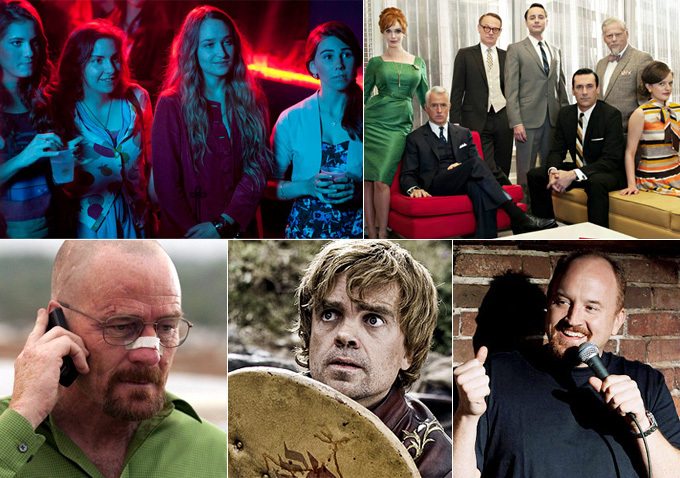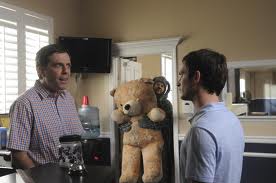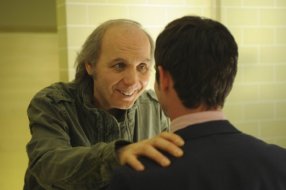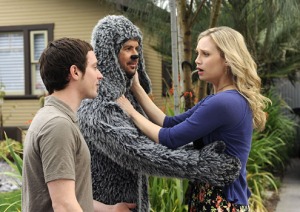Wilfred
The Most Objective “Best of 2012” List Ever, Part I: Television

Around this time of year, every newspaper, magazine, and blog offers up some form of the “Best Of” list, chronicling the best films, television series (or episodes), music, books, Broadway shows, trends, etc. of the previous year. Obviously, ranking the year’s best of anything is subjective and also impossible (after all, only an individual who was watched every television episode that aired in 2012 could state, definitively, which were in the top 5). And yet, such lists are so alluring. As a working mom, who reads, watches and listens to only a fraction of what I would like to read, watch and listen to, these “Best Of” lists take an unwieldy set of pop culture possibilities and whittles it down to a manageable chunk. These lists tell me “These are the only films from 2012 that you need to watch.” Then I take a deep breath and load up my Netflix queue.
You might thinking to yourself “Why would I read a ‘Best Of’ list compiled by a woman who has just admitted that she relies on other people’s ‘Best Of’ lists to tell her what pop culture was worthwhile from the previous year?” Excellent question. Why are you reading this? Don’t you have something better to do? No? Well then settle in, friend. I have some completely subjective selections for you based on an unrepresentative sampling of the year’s popular culture. I think you’ve made the right choice.
So without further ado, I present Part I of my “Best of 2012” list:
Best Television Series

2012 was an excellent year for television. I loved watching Walter White (Bryan Cranston) lose the final pieces of his soul on Breaking Bad. The last shot of the Girls season finale, in which Hannah (Lena Dunham) finds herself on Coney Island (after passing out in the subway and getting her purse stolen) and slowly stuffs her face with cake, was the perfect end to a first season filled with uncomfortable, body-focused stories and imagery. The look on Don Draper’s (John Hamm) face when he sees his daughter wearing fishnets and go-go boots or the scene in which Henry (Christopher Stanley) feeds his newly-plump wife (aka, “Fat Betty”) some steak at the kitchen table in the middle of the night were two highlights of the Mad Men season. I also loved watching all or most of the 2012 seasons of Louie, Boardwalk Empire, Happy Endings, 30 Rock, Parks and Recreation, Don’t Trust the B in Apt 23, Parenthood, Teen Mom, and Game of Thrones. No, I don’t watch Homeland, The Good Wife, or Justified. I’m sure I would like all three, but right now I don’t have room for them in my TV diet. Like I said, “best of” lists are subjective. Let’s move on.
Dog smoking cigarette = win
While I loved all of the aforementioned programs and could make a “Best” case for many of them, my choice for “best” television series of 2012 goes to the FX series, Wilfred, because it is, simply put, the most bizarre show I have ever watched, with the exception of (of course) Twin Peaks.
“Can you hear it?” “No, ma’am, I cannot.”
The pilot episode of Wilfred opens with Ryan (Elijah Woods) trying and failing to commit suicide. We eventually find out that Ryan used to be a successful lawyer, working in his father’s firm, but when we meet him he is unemployed and estranged from his father (the reasons for this are only explained in the second season). Ryan’s attempts to end his life are finally interrupted by his neighbor, Jenna (Fiona Gubelmann), who wants him to watch her dog, Wilfred. Ryan is surprised to discover that Wilfred appears to him as a large, vulgar, Australian pothead (Jason Gann) wearing a very unconvincing dog costume. And the kicker is: Ryan is the only one who sees Wilfred in this way. This may seem like a gimmicky basis for a show, but it is also the source of some of the show’s greatest gags: one minute Wilfred is lecturing Ryan on ethics and the next he is chasing and maiming pelicans on the beach (“It’s a pelican !!! IT’S A PELICAN!!!..It was a pelican!!!”):
In a lukewarm review of pilot, Todd VanDerWerff explains “the show gets a surprising amount of mileage out of having Gann running around in a dog costume and saying things a dog might say if it could speak.” But Wilfred isn’t just shots of Jason Gann humping or chatting up his life partner, Bear, who is a large stuffed bear. The reason I love the show is because it so deftly shifts from bleakness to laugh-out-loud comedy. I often read about how shows like Louie and Girls are changing the rules of the sitcom by offering up tragic moments (like when Louie’s love interest dies in front of him on Christmas Day) in between low-brow body humor and Seinnfeld-ian levels of navel-gazing. But Wilfred takes those devices to another level. In Wilfred, despair and laughter are produced by the same cue — what is light quickly becomes dark, and vice versa.This is because the series is structured around the tension between two realities: either Ryan is a lonely, depressed, schizophrenic who uses an imaginary friend to work through his life’s problems or he is a lonely, depressed but otherwise sane man who happens to see his neighbor’s dog in human form because that is something that happens in this world. Therefore almost every scene on the series can be read in two ways.

Each episode is named after a particular lesson or virtue that Ryan needs to learn, such as “Letting Go,” “Avoidance,” and “Honesty.” Wilfred teaches these lessons to an unwilling Ryan , usually embroiling him in interpersonal conflicts that force the passive man to say or do things he normally wouldn’t. Although Ryan’s suicide attempt from the pilot is barely acknowledged, the series is clearly about teaching Ryan how to “live” (and live) in the world again. Of course, every “lesson” Wilfred teaches Ryan serves Wilfred’s interests in some way. We feel good when Ryan learns to stand up for himself or to reconnect with his institutionalized mother (played by an excellently loopy Mary Steenburgen), but we are always left wondering: is Wilfred helping Ryan to live or is he destroying Ryan’s life, piece by piece? And if Ryan is simply imagining Wilfred, then is Ryan using this dog-shaped delusion as an excuse to destroy his own life? Is he committing suicide, just at an incredibly slow rate?

Wilfred dances in between these many possibilities. Its genius lies in convincing the viewer to believe one scenario and then upending that belief with a single line or image. For example, after Ryan finally gives up on the possibility of romance with Jenna, he begins dating a co-worker named Amanda (Allison Mack). Amanda seems perfect — she’s funny, quirky, and clearly besotted with Ryan. It seems that perhaps Ryan will finally be able to have a loving intimate relationship after past traumas had made this kind of human connection difficult for him. But in “Truth,” Wilfred tries to convince Ryan that he should not move in with Amanda because he is still too mentally unstable. Ryan believes that Wilfred, as usual, is just looking out for his own self interests — if Amanda moves in, Wilfred will lose his best friend. Who will take him for walks or smoke pot with him? As they have this argument, an earthquake traps Ryan and Wilfred in the basement (of course). Bruce (Dwight Yoakam), the only other human who can see Wilfred (and thus the only plot point in the series that lends credence to the theory that Ryan might not crazy), appears to rescue the duo, promising to reveal the “truth” about Amanda that is concealed in a suitcase. This truth will prove why Wilfred is right.

But first, Ryan and Bruce must engage in a game of “Calvinball,” which involves pillow fights and “truth or dare.” The game is deliriously surreal, like so much in the series. When Ryan finally “wins ” the game and is granted access to the magical suitcase, he doesn’t discover anything about Amanda. Instead he finds a timer that tells him that he has spent 12 hours in his basement playing a bizarre game orchestrated by his neighbor’s dog. In other words, Wilfred was right — Ryan should not move in with Amanda.
Ryan is such a likable character (he is kind, empathetic and selfless to a fault) and we want him to be happy. But when we see the timer, the audience realizes — at the same moment that Ryan does — that he is crazy … but wait, is he? Or is this just what Wilfred wants Ryan to think in order to maintain the status quo? Isn’t it suspicious that everything that ends up “being for the best” also happens to serve Wilfred’s interests? These uncertainties are what drive the series and which make this show more than a collection of pooping on the lawn jokes (though I am 100% for a show that is nothing more than pooping on the lawn jokes).

And if that doesn’t interest you, Wilfred is worth watching for its “couch scenes” alone. Incidentally, as I was writing this post I found out that these short scenes, appearing at the end of show (after the main story has been resolved), are called “tags,” or “codas” (thank you Twitter):
Learning is fun!
The tags in Wilfred almost always take place on the couch in Ryan’s basement and feature Ryan and Wilfred engaged in a banal task, like playing a board game or having an inane conversation. They’re always fabulous:
And if that doesn’t interest you? Well, there are loads of other shows to watch. I hear The Good Wife is awesome, so maybe you should watch that instead?
I will be posting my “Best Meme,” “Best Film,” “Best Single,” and “Best of Social Media” picks over the course of the next few weeks. Stay tuned! If you dare!
